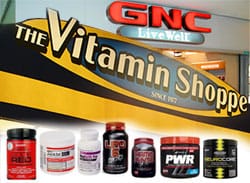
Supplement giants, GNC and the Vitamin Shoppe, refuse to pull DMAA supplements, despite that the U.S. Food & Drug Administration (FDA) has issued a number of warning letters about DMAA-containing products in the past two weeks. Regardless, both GNC and the Vitamin Shoppe continue to sell pre-workout products such as OxyElite Pro and Jack3d online […]
 Supplement giants, GNC and the Vitamin Shoppe, refuse to pull DMAA supplements, despite that the U.S. Food & Drug Administration (FDA) has issued a number of warning letters about DMAA-containing products in the past two weeks.
Supplement giants, GNC and the Vitamin Shoppe, refuse to pull DMAA supplements, despite that the U.S. Food & Drug Administration (FDA) has issued a number of warning letters about DMAA-containing products in the past two weeks.
Regardless, both GNC and the Vitamin Shoppe continue to sell pre-workout products such as OxyElite Pro and Jack3d online and in physical stores as of this week, said CNBC.
Meanwhile, we just wrote that, according to a Boston Globe report, a researcher at Harvard University Medical School authored a “research letter” for publication in the journal Archives of Internal Medicine urging the FDA to act on a warning letter it sent to 10 makers of supplements containing the additive DMAA (dimethylamylamine). The letter urges the FDA to implement a ban of the dietary and weight loss supplement additive.
The FDA directed 10 manufacturers of DMAA supplements to stop distributing their products until they can provide evidence of the additive’s safety. The manufacturers claim and promote their DMAA-containing products as possessing medical qualities that can help in weight loss. The agency believes DMAA causes a narrowing of the arteries, which can lead to heart attacks, stroke, or even sudden death. As a matter-of-fact, DMAA-containing supplements have been implicated in two recent deaths of U.S. soldiers who had traces of the chemical in their systems following their post-workout deaths on military bases.
DMAA supplements have also been linked to other, less serious. complications sufficiently significant to warrant a warning letter from the FDA. Complications cited included panic attacks, dizziness, and seizures.
Companies maintain DMAA is a product that exists in nature and is derived from the geranium plant; however, the FDA challenges these claims, said CNBC. The FDA’s warning letter states that making medical claims on these supplements requires manufacturers to provide evidence that the product is safe for human use and that the product’s risks do not outweigh any potential benefits. Otherwise, the agency considers the products “adulterated” and does not permit their sale. Removing these claims would force these DMAA supplement purveyors to find alternative retailers to market them, taking them out of health and fitness stores and relegating the supplements to convenience store counters and without those same health benefit claims attached.
A prior CNBC report indicated that at least seven studies have failed to show that DMAA is derived from geranium oil. In January, the American Herbal Products Association (AHPA), the only national trade association that is focused on herbs and herbal products, informed its members that DMAA should not be labeled as a product of geranium oil.
Meanwhile, as we’ve written, in February, GNC was one of several companies named in a California class action lawsuit that accused it and other defendants of making misleading claims regarding Cellucor’s C-4 Extreme supplement, which contains DMAA. The lawsuit alleges GNC and other defendants failed to disclose that DMAA is wholly synthetic, manufactured, and not derived from the geranium plant.


